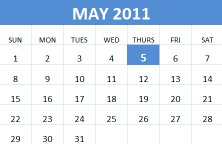Why is an Assembly election being held now?
 Every four years, the Northern Ireland Assembly is required to hold an election on the first Thursday in May. This is in accordance with the Northern Ireland Act 1998 (section 31).
Elections to the Assembly will take place on Thursday 5th of May 2011. Every four years, the Northern Ireland Assembly is required to hold an election on the first Thursday in May. This is in accordance with the Northern Ireland Act 1998 (section 31).
Elections to the Assembly will take place on Thursday 5th of May 2011.
Why did the Assembly dissolve from midnight on Thursday 24th March 2011?
The previous Assembly must be dissolved before the election can be held. (Dissolution is the official term for the adjournment of the Assembly, pending new elections to it.)
The period between the Assembly dissolving and the election is set by an Order made by the Secretary of State.
The length of the pre-election period was set by the Secretary of State in The Northern Ireland Assembly (Minimum Period) Order 2010. On 9 December 2010 he set this period at 26 days (excluding Saturdays, Sundays and Bank Holidays). It is for that reason that the Assembly dissolved from midnight on the 24th of March 2011.
What does Dissolution mean for the Assembly
During the pre-election period (dissolution) all the 108 MLAs cease to be MLAs. Since the Assembly requires MLAs to carry out both Assembly debates and Committee work, the Assembly cannot conduct official business. The Assembly will resume its business when newly elected MLAs take their seats after the election. Parliament Buildings, however, will remain open to the public from 9:00am to 4pm Monday - Friday.
What happens after the election?
Newly elected MLAs take their seats and are able to participate in Assembly proceedings once they have signed the Roll of Membership. This is normally done at the first sitting but MLAs who are not present on that occasion may sign the Roll at the earliest opportunity thereafter (see Standing Order 3(3)).
What are Standing Orders?
Standing Orders are the rules agreed by MLAs under which the Assembly operates.
 When will the first sitting of Plenary be? When will the first sitting of Plenary be?
The date of the first sitting has not been set, but the Assembly must meet by Monday 16 May 2011 to comply with the Northern Ireland Act 1998.
Under Standing Order 2 the Clerk to the Assembly must issue a notice to all Members stating the place, date and time of the first meeting.
After MLAs have signed the Roll their first task will be to elect a Speaker so that Assembly proceedings can begin.
How are the Speaker/Deputy Speakers elected?
Nominations for the post of Speaker are sought by the outgoing Speaker (if the current Speaker is not seeking re-election) or by an Acting Speaker (the oldest Member present at the meeting) (see Standing Orders 3 and 4).
There may be more than one nomination and each nomination must be seconded. The nominee must accept the nomination. The Speaker/Acting Speaker puts the question “that …… (the only candidate or the person first proposed) be Speaker of this Assembly”.
The candidate must be approved with cross-community support. If the first candidate does not get this, Members will vote on a second or third candidate until one is elected with cross-community support.
Three Deputy Speakers are also elected with cross-community support. The procedures for nominations, seconding of nominations and acceptance of nominations are the same as for election of Speaker (see above and Standing Order 5).
How will the First Minister and deputy First Minister be appointed?
The offices of First Minister and deputy First Minister must be appointed within a period of seven days beginning with the first meeting of the Assembly. Under section 16A of the NI Act 1998 and Standing Order 44 the First Minister is nominated by the largest party of the largest political designation and the deputy First Minister is nominated by the largest party of the second largest political designation. After each of them has affirmed the pledge of office in the Assembly, they jointly take up office.
When will the Assembly appoint the other Ministers?
These offices must also be filled within a period of seven days beginning with the first meeting of the Assembly. The d’Hondt system will be used for the nomination of Ministers and for the nomination of Committee Chairpersons and Deputy Chairpersons.
What is d’Hondt?
d’Hondt is the way that Northern Ireland appoints Ministerial positions (see Standing Order 44). It is also used to appoint Committee Chair and deputy Chair positions (see Standing Orders 47 to 52). It uses a formula set out in section 18(2) to (5) of the Northern Ireland Act 1998. The d’Hondt formula is based on the number of seats held by parties on the first day the Assembly meets after the election and it ensures that Ministerial positions are allocated according to the party strengths within the Assembly.
How are Committee members selected to serve on the Committees?
Members of Statutory and Standing Committees are firstly put forward by their own parties and each Member is offered at least one statutory committee place.
Party whips and the Assembly’s Business Committee have a role in ensuring that membership of committees is allocated in accordance with party strengths within the Assembly. The allocation of seats to parties or individual Members is undertaken by the Business Committee and has to be approved by the Assembly.
How can I find out what's happening in the Assembly?
Assembly business is published on the website at
http://archive.niassembly.gov.uk/this_week.htm and will be updated in time for the first sitting of the Assembly.
|
